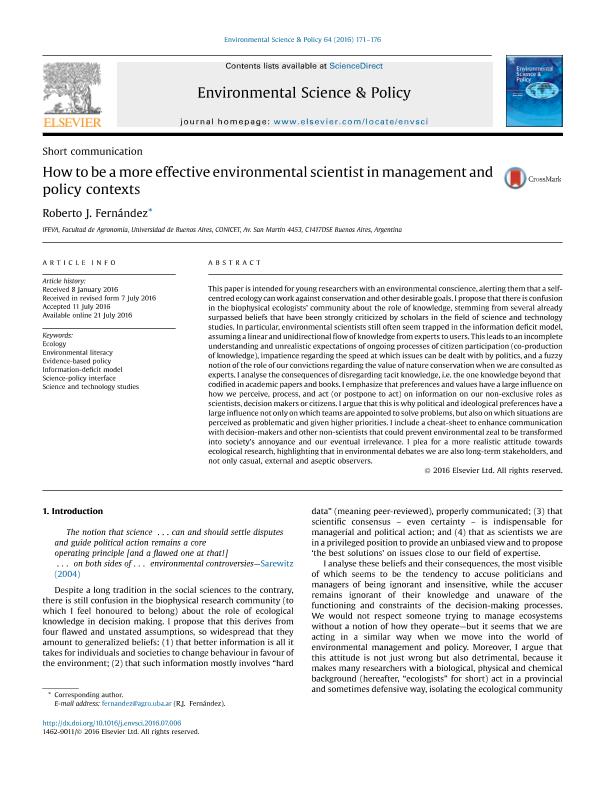Artículo
How to be a more effective environmental scientist in management and policy contexts
Fecha de publicación:
10/2016
Editorial:
Elsevier
Revista:
Environmental Science & Policy
ISSN:
1462-9011
Idioma:
Inglés
Tipo de recurso:
Artículo publicado
Clasificación temática:
Resumen
This paper is intended for young researchers with an environmental conscience, alerting them that a self-centred ecology can work against conservation and other desirable goals. I propose that there is confusion in the biophysical ecologists’ community about the role of knowledge, stemming from several already surpassed beliefs that have been strongly criticized by scholars in the field of science and technology studies. In particular, environmental scientists still often seem trapped in the information deficit model, assuming a linear and unidirectional flow of knowledge from experts to users. This leads to an incomplete understanding and unrealistic expectations of ongoing processes of citizen participation (co-production of knowledge), impatience regarding the speed at which issues can be dealt with by politics, and a fuzzy notion of the role of our convictions regarding the value of nature conservation when we are consulted as experts. I analyse the consequences of disregarding tacit knowledge, i.e. the one knowledge beyond that codified in academic papers and books. I emphasize that preferences and values have a large influence on how we perceive, process, and act (or postpone to act) on information on our non-exclusive roles as scientists, decision makers or citizens. I argue that this is why political and ideological preferences have a large influence not only on which teams are appointed to solve problems, but also on which situations are perceived as problematic and given higher priorities. I include a cheat-sheet to enhance communication with decision-makers and other non-scientists that could prevent environmental zeal to be transformed into society's annoyance and our eventual irrelevance. I plea for a more realistic attitude towards ecological research, highlighting that in environmental debates we are also long-term stakeholders, and not only casual, external and aseptic observers.
Archivos asociados
Licencia
Identificadores
Colecciones
Articulos(IFEVA)
Articulos de INST.D/INV.FISIOLOGICAS Y ECO.VINCULADAS A L/AGRIC
Articulos de INST.D/INV.FISIOLOGICAS Y ECO.VINCULADAS A L/AGRIC
Citación
Fernandez Alduncin, Roberto Javier; How to be a more effective environmental scientist in management and policy contexts; Elsevier; Environmental Science & Policy; 64; 10-2016; 171-176
Compartir
Altmétricas




